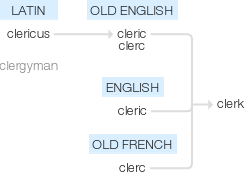Clerk
Old English cleric, clerc (in the sense ‘ordained minister, literate person’), from ecclesiastical Latin clericus ‘clergyman’ (see cleric); reinforced by Old French clerc, from the same source. clerk (sense 1 of the noun) dates from the early 16th century.
wiktionary
From Middle English clerc, from Old English clerc, from Late Latin clēricus(“a priest, clergyman, cleric", also generally "a learned man, clerk”), from Ancient Greek κληρικός(klērikós, “(adj. in church jargon) of the clergy”), from κλῆρος(klêros, “lot, inheritance,” originally “a shard used in casting lots”). Doublet of cleric.
etymonline
clerk (n.)
c. 1200, "man ordained in the ministry, a priest, an ecclesiastic," from Old English cleric and Old French clerc "clergyman, priest; scholar, student," both from Church Latin clericus "a priest," noun use of adjective meaning "priestly, belonging to the clerus" (see cleric).
Modern bureaucratic usage is a reminder of the time when clergy alone could read and write and were employed as scribes and account-keepers by secular authorities. In late Old English the word also can mean "king's scribe; keeper of accounts." And by c. 1200 clerk took on a secondary sense in Middle English (as the cognate word did in Old French) of "man of letters, anyone who can read or write."
This led to the senses "assistant in a public or private business" (c. 1500), originally a keeper of accounts, also "officer of a court, municipality, etc. whose duty it is to keep its records and perform its routine business" (1520s), and later, especially in American English, "a retail salesman" (1790). Meaning "an employee who registers guests in a hotel" is by 1879.
clerk (v.)
"act or serve as a clerk," 1550s, from clerk (n.). Related: Clerked, clerking.
